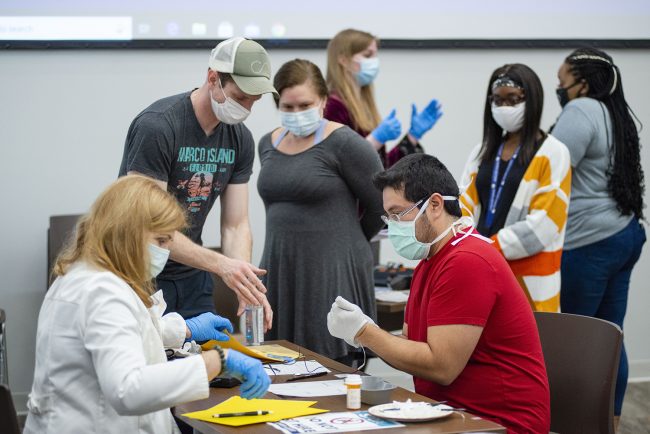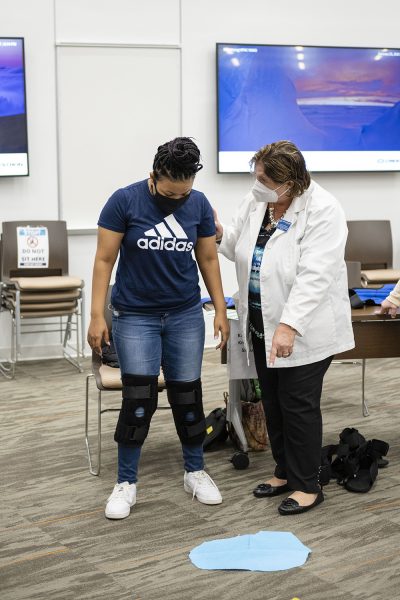Georgia Southern students get glimpse of disability complications through simulation


Recently students on the Georgia Southern University Armstrong Campus experienced first-hand the obstacles and issues older adults with disabilities go through after participating in a series of simulations. The event was organized by the Omicron Delta Kappa (ODK) National Leadership Society and the Armstrong Campus chapter of the Institute for Healthcare Improvement (IHI).
Forty-six students attended the event, which was led in person and on Zoom by Debra Hagerty, DNP, associate professor of nursing and advisor for ODK. Hagerty secured a Georgia Health Foundation grant to buy the equipment for the simulation.
“I teach nursing leadership, but I have a passion for geriatric care,” Hagerty said. “When nurses go through education, they don’t get a lot of information about sensory issues and disabilities elders have or could have. We wanted to train students in disabilities and increase awareness in geriatric issues through a fun student event.”
The student presidents of IHI, Ana Lanier and ODK, Rachel Tinker, facilitated student engagement, and professor Janet Buelow, Ph.D., faculty advisor for IHI, assisted with the event coordination and implementation. Students attending were from a variety of disciplines making this a successful multidisciplinary participation event. Additionally, nursing faculty, including Kat Tremblay, Margaret Olsen, Tijuana Milton and Helen Taggart, Ph.D., gave their time and talents to create opportunities for students and engage them in powerful student learning activities.
Students were able to experience disabilities that were simulated during the sessions. Examples of the experiential learning included arthritis, back pain, hearing and vision loss, tinnitus, tremors, chronic obstructive pulmonary disease, gait disturbance, kyphosis and Hemiparesis. Students donned arm, back and knee braces, gloves, special shoes, glasses and other equipment while trying to do normal tasks. Things such as walking, writing, sitting and standing, climbing stairs and stepping over obstacles such as puddles, throw rugs, and picking up objects off the floor were more difficult than anticipated and in some cases provided potential safety hazards to experience and navigate.
Students said experiencing the disabilities was powerful and helped them have a better understanding of geriatric issues.
“I thought the tasks were going to be a lot simpler and physically easier to do,” Te’Seante Mcclain, senior health science major, said. “When I went through the simulations, I was like, ‘Whoa.’ It was a lot more difficult than I expected it to be.”
Hagerty said one of the goals for the event was to have students take what they learned from the simulations and apply it to their studies and future careers. She felt the students became more sensitive and aware of the needs of elders, saw what growing older is like by experiencing similar conditions and disabilities. Philip Long, a junior nursing student, said having an understanding of the issues older and disabled people face benefits him as he pursues a career as an emergency room nurse.
“I think this hands-on experience will help as far as being more considerate and compassionate to how patients are feeling with various conditions and being able to make them optimally comfortable, which is good,” Long said. “One of the big facets of nursing is caring, and this experience is going to result in better care and probably a better outcome for patients.”
The event occurred in consideration of all Georgia Southern COVID-19 safety standards and adherence to masks at all times and social distancing as possible.
Posted in Events, Faculty Highlights

